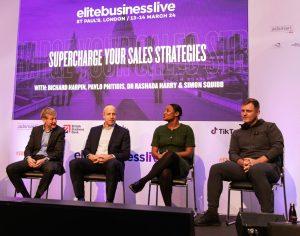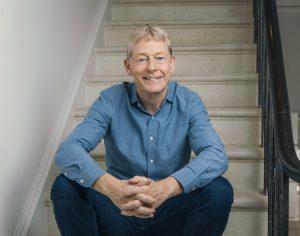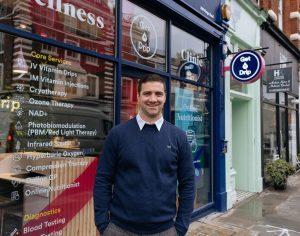RobLaw, designer and inventor of the award-winning children’s ride-on suitcasebrand, Trunki, has published his book, 65 Roses and a Trunki, to inspireothers to “defy the odds in life and business
What seems like an insurmountable problem can be overcome, the storm will pass but it will be exhausting and you need all your mental energy to overcome it, Rob Law tells me. So, use that energy wisely, stay focused on the things you can control and ignore the rest.
Rob and his twin sister, Kate, were both born with cystic fibrosis, a progressive, genetic disease which causes severe damage to the lungs, digestive system and other organs in the body. Growing up in a small village near Chester, Rob had to deal with the challenges of his life-threatening condition, undergoing countless physiotherapy appointments and regular medication. Patients with cystic fibrosis often face fertility issues so Rob spent most of his life believing he would never be a father – and doctors warned he wouldn’t make it past his 20s.
At 15-years-old, Rob lost his sister, Kate, who succumbed to her condition – and that tragic moment turned his life around forever. It was unbearably painful to see my sister who was full of joy, lying lifeless on a bed covered with tubes and to know we would never laugh together again, Rob said. I remember seeing the huge pain mum was feeling and I just wanted to run away. I decided to make her a promise that she would never grieve like this over me. I made a promise that I would live and this is where the book starts.
In 1997, Rob was asked to design luggage as part of his product design course at Northumbria University and came up with a unique idea for a conventional child-friendly suitcase. He noticed ride-on toys took up a lot of space and invented a way to turn them into luggage carriers so children can be entertained on flights. I was 19 and a 2nd year Product Design student at Northumbria University, Rob said. During the course, we were asked to enter a national luggage design competition. When I went looking for inspiration at a department store, I found myself looking at ride-on toys for kids and thinking about how much space they waste. Often, they have a lift-up seat with barely enough space to store an apple. The idea came to me to make a ride-on toy that maximised the internal space so it could function as luggage and entertain kids while travelling. I went on to win the competition and approached a luggage manufacture to licence the design. They told me I’d invented a toy and when I approached toy manufacturers, they said it was luggage!
That’s when the idea for Trunki began. Rob pitched his idea to BBC’s Dragon’s Den, asking for £100K to launch the product to the masses. However, a devastating turn of events caused his product to be completely rejected by the panel and ridiculed on national TV, with the episode advertised as Wheelie Rubbish. Speaking about the humiliating moment, Rob said: The pitch went well and I towed Richard Farleigh around the studio. Everything was going to plan until Theo got hold of Trixie, the pink Trunki, and used his brute force to pull off the tow strap. At that moment we all lost our judgment. I failed to convince the Dragons it was an easy problem to solve as the hook just needed moulding in a stronger plastic, but the Dragons turned into a pack and attacked. Among their many negative comments were, ‘Your business is currently worthless,’ ‘I don’t see the business opportunity’, ‘I don’t like the product, I don’t like the business. I’m out’. I left the Den wishing I’d invented a time machine, not a ride-on suitcase! Four months later when the programme aired, BBC advertised the episode as ‘Wheelie Rubbish’ and I knew this could be game over for my business.
However, Rob used the opportunity to gain customer feedback about his product and launched a public survey to analyse what people thought of his Trunki luggages. His survey received an overwhelming response and product sales skyrocketed. Trunki has since gone on to become a successful global brand, selling millions of units worldwide. I also realised I would get a decent amount of web traffic, even though I might not sell a single Trunki, so I thought I’d try and use the opportunity to gain customer feedback on the product, Rob said. That night over 2,000 people filled in the survey with amazing endorsements and delight in discovering my brand. Despite my humiliation in the Den, I’d proved that there was a market for this unique product. Parents and children loved it. That night I sold out my entire stock and couldn’t keep up with the demand for the next three years.
Since its official launch in May 2006, Trunki has won more than 120 national business awards including The National Business Awards SME of the Year. Rob has also received an MBE from the Queen for Services to Business and is now a Cystic Fibrosis Trust Patron, an inspiration to many people living with a life-threatening illness. Rob has also defied the odds with his health and is now a father to an 18-month-old girl despite fears he would never be a dad because of his condition. Rob has shown determination, perseverance and diligence throughout his life despite facing numerous obstacles along the way. He has now published a book 65Roses and a Trunki: Defying the odds in life and business, detailing his extraordinary success and how he overcame struggles, as a memoir to inspire anyone facing difficult challenges in life or business. It’s all about sustaining a resourceful and resilient mindset, Rob said. Realising my life would be short, I put cystic fibrosis behind a wall and didn’t think too much about it. My daily routine of physio and drugs was just a routine and I believed I was as normal as the next person. Sport played a key role in keeping me healthy, although I was no good at football and cricket which more down to poor co-ordination than fitness. I found I was a good middle-distance runner. I also loved mountain biking and took up swimming. Later in life, I became a triathlete and competed in Half Ironman Triathlons. I knew from a young age I couldn’t fulfil my dream of being an astronaut as they need strong lungs and the same was true for being a soldier. I also have dyslexia and was stuck in Special Needs classes in school but I knew I was good with my hands and loved art and woodwork. At 14 after researching design careers, I discovered product design and found my real passion, ‘my element’ as Sir Ken Robinson says. I then focused intently on doing all I needed to get onto the best university course in the country. So, I guess that defying the odds is down to finding a passion, maintaining a relentless focus on getting better at it and embracing the challenges that get in the way of progress.
On a final note, Rob said: What seems like an insurmountable problem can be overcome, the storm will pass but it will be exhausting and you need all your mental energy to overcome it. So, use that energy wisely, stay focused on the things you can control and ignore the rest. You need an open mind to see the opportunities you have and to make the most of them. That may take you away from your initial direction so be open to change. There are no right or wrong ways, just ways that work and ways that don’t. Remember success is just a hiatus in a series of defeats.
“
Share via:

















































